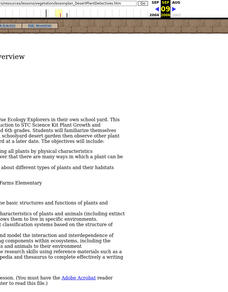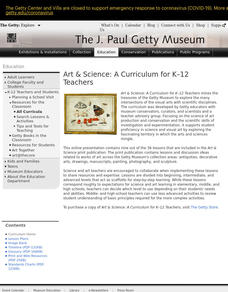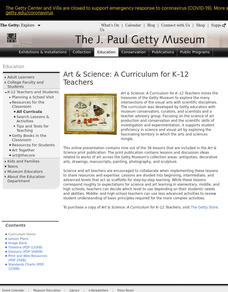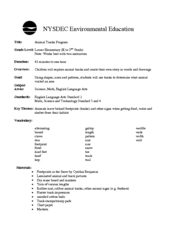Curated OER
"Five Little Seeds"
Fourth graders complete various activities related to the plant life cycle. They read the book "The Tiny Seed," read and discuss the poem "Five Little Seeds," complete a "Plantenstein Mystery" and other online activities, write and...
Curated OER
Classify That!
Students explore diverse forms of life by using modern biological classification systems to group animals that are related. Students then study basic scientific groupings like genus, species, mammals, fish, birds, amphibians, and...
Curated OER
Plants 1: Plant Parents
Middle schoolers review their prior knowledge on plants. In groups, they compare and contrast the difference between reproducing asexually and sexually. Using the internet, they research how some plants can be forced to produce asexually.
Curated OER
Desert Plant Detectives
Students examine and categorize plants in their own schoolyard desert garden and then observe other plant areas of their schoolyard.
Curated OER
The Five Classes of Vertebrates
What a terrific lesson plan! Learners discuss the animal kingdom, and classify them as vertebrates and invertebrates. They also identify them as fish, amphibians, reptiles, birds, and mammals. There is even a taxonomic breakdown of...
Curated OER
Distinguishing Between Flowers
A branching key is a great way to classify different types of animals and plants! Fifth graders answer several yes/no answers about three different plants. They then create their own key to differentiate between an iris, a rose, and a...
Nature New Brunswick
Habitat for Endangered Wildlife and You
Compare and contrast your habitat with that of endangered plants and animals! Learners discuss what a habitat is actually comprised of, describing what theirs looks like. They fill out a graphic organizer explaining what they eat, how...
Curated OER
Species Diversity in Ecosystems with Different Techniques of Land Management
Students visit numerous places to help in their understanding of Ecology. In this biology lesson plan, students will learn about characteristics and how to identify numerous plants and animals. This instructional activity allows for many...
Curated OER
Clearly Classified
Learners investigate plants and insects. In this science classification lesson, students create separate categories for insects and plants by characteristics. Learners discover scientific names of insects.
Curated OER
Clearly Classified
Young scholars review the classification system for living organisms and apply it the classification of insects and flowers in the still life by Ambrosius Bosschaert. They create a chart classifying the animals and plants in the painting...
Curated OER
Water, Water Everywhere (Pond Animals)
Second graders examine the characteristics of animals who live in a pond environment. In groups, they describe the various stages in the life of a frog and identify the characteristics of other pond animals. Using this information,...
Wild BC
Carbon - The Short and the Long
For this complex game about the carbon cycle, the playing field is divided into air, living, and earth zones. Children are assigned to be either plants or animals, and collect carbon tokens as they proceed from zone to zone. While the...
Curated OER
See Our Collection
First graders classify plants and animals based on their characteristics using examples from the westward journey of Lewis and Clark and the Corps of Discovery.
Curated OER
Classifying Life
In this classifying life worksheet, high schoolers review the 5 kingdoms of organisms by completing 10 matching and 7 fill in the blank questions.
Curated OER
Classified Information - Part 1: Shapes
Third graders investigate how and why scientists use classification. They discuss classification strategies using animals, and as a class fill in a flowchart with their responses. Next, in small groups they cut out a variety of shapes...
Curated OER
Classifying Commercial Marine Species
Students investigate taxonomy. They explore some of the commercial marine species caught in Magdalena Bay and develop a classification system for presented animals.
Curated OER
Woodland Animals and Their Habitat
Students explore the natural environment through a video and nature sounds tape. They keep journal's of the unit's activities and vocabulary terms. They play a web of interdependence game and compose a list of forest animals and write...
Curated OER
What's Wild
Third graders discover the differences between wild and domestic animals. In this animal lesson, 3rd graders chart the differences in the animals and look through magazines for pictures of wild and domestic animals to glue to a poster....
Curated OER
Skulls Tell It All
Skulls tell it all, and with this lesson plan, you will tell it all to your class! Youngsters view animal skulls, analyzing the shape of teeth and the placement of the eye sockets. They associate these adaptations with the types of food...
Curated OER
Do Medicines Grow on Trees and Plants?
Learners study the importance of preserving rainforest. They investigate the uses of rainforest plants for medicinal uses by participating in rainforest immersion activities.
Curated OER
Animal Tracks Program
Entice your learners with this lesson on animal footprints. After reading the story Footprints in the Snow by Cynthia Benjamin, they use photos to identify animals and their footprints. Then they participate in an activity to classify...
Curated OER
Forest Ecology
Students examine the different plants and animals in British Columbia. In this forest ecology instructional activity students explore how ecosystems work, classify animals and investigate food webs and chains.
Curated OER
Understanding Science Vocabulary And Categorization
Students explore and examine scientific language and categorization as related to commonly known plants and animals. They hypothesize about a specific plant or animal, how it was scientifically named, what concepts and vocabulary is...
University of Hawaiʻi
Taxonomy and Me!
Taxonomy is the study of organisms and how you phylum. Three biology activities are included, helping scholars understand four of the six kingdoms, specifically Protista, Plantae, Fungi, and Animalia. Scholars observe and classify in...

























